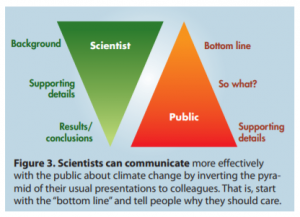I love a good podcast so when I found one which links to data storytelling obviously it went straight on my list.
Not only is it a great listen there's also loads to learn from as analysts seeking to ensure our insights translate into action.
'How They Made Us Doubt Everything' is about the methods used by the tobacco lobby to dispute the connection between smoking and cancer and how the same tactics were used to cast doubt on other scientific findings including climate change. It’s about why these messages took so long to be widely accepted, despite huge scientific consensus.
You'd think that with all their academic qualifications, a solid grounding in data and top quality research it would be easy for climate scientists to win over the public and make everyone see what the evidence is saying. But it wasn’t easy at all. Time and again respected scientists were overshadowed in debates and talked down by counterpoints with little to no scientific knowledge. They were struggling to win the public support and they couldn't understand why.
It wasn’t just a case of the public being anti-experts, the issue was communication. In essence the scientists hadn't put much thought into how to tell the story of the data to the public and didn’t invest in media or communication training. After all, they had far too much actual science to do to invest time on slick presentation styles or any of that "fluffier" stuff. They simply did the maths and expected the facts to speak for themselves.
The problem was, that’s not how it works.
In frustration the scientists focused on producing more. More evidence, longer reports, more charts, more data…. Surely, they thought, if people see enough facts then they will understand?! But the more analysis they did the less the message seemed to get through…. (sound familiar anyone??)
Meanwhile their counterparts who were looking to cast doubt on the science spent time crafting a simple (if misleading) message, talking in ways that ordinary people understand, exploiting the caveats and jargon the scientists used, and using examples and metaphors that people could relate to. They focused on being good communicators, relating to people, presenting with authority and selling an idea. They may not have had the evidence on their side, but they were convincing - and people listened.
“Don’t Speak" about Data Science
In the podcast Susan Joy Hassol talks about turning the tide of public opinion and how she works with climate scientists to explain their findings in a way that connects with people. She describes her role as Science Communicator as "translating science into English" and mentions some great tips that we can definitely learn from in data science. The key point to take away is that the responsibility for explaining our analysis sits with us! It's simply not enough to do the data work and wait for people to understand it themselves and take action.
"Trying to get them to dumb it down? No! it's not dumbing down, its smartening up. The only thing that’s dumb is speaking to people in a language they don’t understand." - Susan Joy Hassol, Climate Science Communicator.

How to be more effective at communicating what you know, how you know it, and how sure you are of it:
- Start with the bottom line, the why, the so what?
- Don’t talk in jargon, no one wants to have to trawl through a glossary to work out your point!
- Lead with what you know, a common mistake is to start with what we don't know yet.
- Clearly state your conclusions - don’t overdo it with the 'weasel words' and caveats, this will cause doubt.
- Craft clear, simple messages and repeat them.
- Go easy on the detail, people often have trouble sorting through what's important - the more you say, the less they hear!
Leave a comment